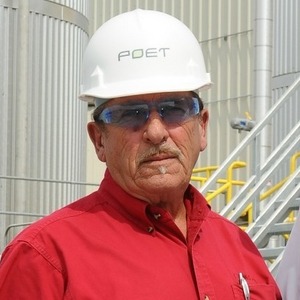Missouri's first ethanol plant has rich history

PHOTO: DAKOTA DYLAN
July 11, 2013
BY Susanne Retka Schill
Poet Biorefining-Macon board chairman John Eggleston’s vision of getting projects done dates to the mid-1990s when he first became chairman of Northeast Missouri Grain Processors Inc., the first group to propose a corn ethanol plant in the state. “I don’t know if it pays to be the first one out of the gate,” he recalls. “It was a struggle.” As the organizers were trying to build support and recruit farmer investors for the new-style cooperative, Eggleston gave Jeff Broin, now chairman of the board at Poet, a call. Thus, from the very start, the Broin companies were part of the effort. “Jeff made numerous trips to Missouri,” Eggleston recalls. “We traveled a lot of miles and talked to a lot of people, to bankers, investors, state legislators, attorneys.”
The cooperative ultimately signed up 311 farmer investors and become the single largest investor in the company organized to build the ethanol plant, holding about 80 percent of the shares in Northeast Missouri Grain LLC. Other investors in the LLC included Broin Enterprises Inc., Corn Energy Investors of Sioux Falls, the Missouri Corn Merchandising Council and Ralls County Electric Cooperative.
In 2009, the cooperative converted to a limited liability business structure to allow nonfarmers to join as investors and was renamed NEMO Grain Processors LLC. Eggleston serves as chairman of both NEMO and the board of directors of the ethanol plant. “It has been a better investment than anyone would have ever dreamed,” he says, one that has been reinvested. “We are investors in a sister plant in Laddonia, Mo., and have investments in Cloverdale and Alexandria, Ind.,” Eggleston says. “We did these as sidelines because our footprint [at Macon] was as large as it could get. We couldn’t do a 100 MMgy plant here.” NEMO also invested in other projects as well, including a biodiesel plant in Mexico, Mo.
A big change came in 2008, when the Poet brand was adopted. There were a lot of discussions to get everyone on the same page, Eggleston recalls. “Not everybody wanted to give up the individuality because of their pride in the ownership of the plant.” Eggleston says the unifying image that the Poet brand brought with it has been successful, particularly when it comes to lobbying, as the group under a common brand carries more clout than an individual plant. Plus, there’s the advantage of joining forces in regulatory battles. “If you are out there by yourself as a Macon plant without the other 26 plants, the dollars are so great there’s no way you can take on the challenges of some of these battles,” Eggleston says.
Advertisement
Advertisement
Eggleston has served as board chairman of NEMO and its predecessor since the beginning, along with three others. He has also served as chairman of the board of the ethanol plant, which has representation from NEMO, Poet, as well as the other major investors. The board contracts with Poet’s different divisions that offer engineering and marketing services, as well as day-to-day plant management. Being part of the Poet family balances local buy-in and control with the advantages of larger scale corporate management. Combined, Poet’s 27 plants (only one of which is solely owned—the company’s first plant, now the Poet Research Center, at Scotland, S.D.) have a capacity of 1.6 billion gallons, making it the country’s largest dry-mill ethanol producer.
To read about what the Macon plant did when drought forced a shut down, see a story printed in the August issue of Ethanol Producer Magazine.
Advertisement
Advertisement
Related Stories
The European Commission on July 18 announced its investigation into biodiesel imports from China is now complete and did not confirm the existence of fraud. The commission will take action, however, to address some systemic weaknesses it identified.
Kintetsu World Express Inc. has signed an additional agreement with Hong Kong, China-based Cathay Pacific Airways for the use of sustainable aviation fuel (SAF). The agreement expands a three-year partnership between the two companies.
Broco Energy on July 17 announced a new partnership with the Massachusetts Port Authority (Massport) to deliver and transition Massport's fuel tanks to renewable diesel across its various facilities.
Shell Aviation, Accenture, and Amex GBT on July 10 announced Avelia is in the process of evolving to an industry solution with independent data hosting and a multi-supplier model helping users access the GHG benefits of SAF.
The U.S EPA on July 17 released data showing more than 1.9 billion RINs were generated under the RFS during June, down 11% when compared to the same month of last year. Total RIN generation for the first half of 2025 reached 11.17 billion.
Upcoming Events










